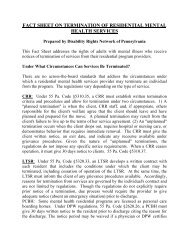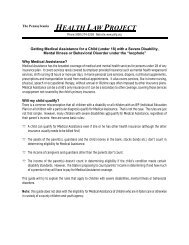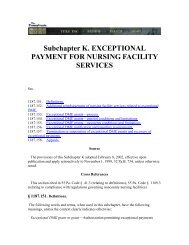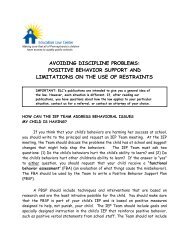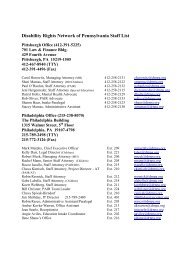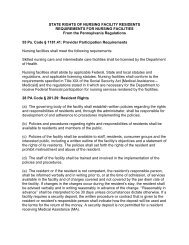Complaint - Disability Rights Network of Pennsylvania
Complaint - Disability Rights Network of Pennsylvania
Complaint - Disability Rights Network of Pennsylvania
Create successful ePaper yourself
Turn your PDF publications into a flip-book with our unique Google optimized e-Paper software.
IN THE UNITED STATES DISTRICT COURT<br />
FOR THE MIDDLE DISTRICT OF PENNSYLVANIA<br />
____________________________________<br />
:<br />
FRANKLIN BENJAMIN, by and through :<br />
his next friend, Andreé Yock; RICHARD :<br />
GROGG and FRANK EDGETT, by and :<br />
through their next friend, Joyce McCarthy; :<br />
WILSON SHEPPARD, by and through his :<br />
next friend, Pamela Zotynia; SYLVIA :<br />
BALDWIN, by and through her next friend, :<br />
Shirl Meyers; ANTHONY BEARD, by and :<br />
through his next friend, Nicole Turman, :<br />
on behalf <strong>of</strong> themselves and all others :<br />
similarly situated, :<br />
:<br />
Plaintiffs, : Filed via ECF System<br />
:<br />
v. : Civil Action No. _____________<br />
:<br />
DEPARTMENT OF PUBLIC WELFARE : Class Action<br />
OF THE COMMONWEALTH OF :<br />
PENNSYLVANIA and :<br />
ESTELLE B. RICHMAN, in her <strong>of</strong>ficial :<br />
capacity as Secretary <strong>of</strong> Public Welfare <strong>of</strong> :<br />
the Commonwealth <strong>of</strong> <strong>Pennsylvania</strong>, :<br />
:<br />
Defendants. :<br />
____________________________________:<br />
I. Introduction<br />
COMPLAINT<br />
1. Plaintiffs, individuals who are institutionalized in <strong>Pennsylvania</strong>’s stateoperated<br />
intermediate care facilities for persons with mental retardation (ICFs/MR),<br />
bring this lawsuit on behalf <strong>of</strong> themselves and others similarly situated to challenge
the Defendants’ continuing failure to <strong>of</strong>fer and provide them with the opportunity to<br />
receive services in integrated, community settings that are the most appropriate<br />
settings to meet their needs, resulting in their continued unnecessary segregation and<br />
institutionalization.<br />
2. Despite the fact that Plaintiffs and many others in the state-operated<br />
ICFs/MR want to live in community settings and that the community is the most<br />
integrated setting appropriate to meet their needs, Defendants have not <strong>of</strong>fered them<br />
any alternative to remaining institutionalized.<br />
3. The costs <strong>of</strong> providing community services to Plaintiffs and putative<br />
class members would be far less than the costs <strong>of</strong> continuing to institutionalize them.<br />
The average annual cost <strong>of</strong> providing services in a state-operated ICF/MR is nearly<br />
$228,000 per person, more than double the average per capita cost <strong>of</strong> providing<br />
community services (including residential services) to such an individual.<br />
4. Defendants’ failure to <strong>of</strong>fer and provide community alternatives to<br />
Plaintiffs and other persons confined in ICFs/MR who are appropriate for and not<br />
opposed to discharge violates Title II <strong>of</strong> the Americans with Disabilities Act and<br />
Section 504 <strong>of</strong> the Rehabilitation Act. Plaintiffs seek appropriate declaratory and<br />
injunctive relief.<br />
2
II.<br />
Jurisdiction and Venue<br />
5. This Court has jurisdiction over this action pursuant to 28 U.S.C. §§<br />
1331, 1343(a)(3), and 1343(a)(4).<br />
6. Plaintiffs’ claims are authorized by 42 U.S.C. §§ 1983 and 12133, 29<br />
U.S.C. § 794a(a)(1), and 28 U.S.C. §§ 2201 and 2202.<br />
7. Venue is appropriate in this district pursuant to 28 U.S.C. § 1391(b)<br />
since Defendants reside in this District.<br />
III.<br />
Parties<br />
8. Plaintiff Franklin Benjamin is a 48-year-old resident <strong>of</strong> Philadelphia,<br />
<strong>Pennsylvania</strong> who has been institutionalized in a state-operated ICF/MR since 1966.<br />
He brings this lawsuit by and through his next friend, Andreé Yock, pursuant to<br />
Federal Rule <strong>of</strong> Civil Procedure 17(c).<br />
9. Plaintiff Richard Grogg is a 45-year-old resident <strong>of</strong> York County,<br />
<strong>Pennsylvania</strong> who has been institutionalized in a state-operated ICF/MR since 1988.<br />
He brings this lawsuit by and through his next friend, Joyce McCarthy, pursuant to<br />
Federal Rule <strong>of</strong> Civil Procedure 17(c).<br />
10. Plaintiff Frank Edgett is a nearly 51-year-old resident <strong>of</strong> Cumberland<br />
County, <strong>Pennsylvania</strong> who has been institutionalized in a state-operated ICF/MR<br />
3
since 1987. He brings this lawsuit by and through his next friend, Joyce McCarthy,<br />
pursuant to Federal Rule <strong>of</strong> Civil Procedure 17(c).<br />
11. Plaintiff Wilson Sheppard is a 46-year-old resident <strong>of</strong> Philadelphia,<br />
<strong>Pennsylvania</strong> who has been institutionalized in a state-operated ICF/MR since 1969.<br />
He brings this lawsuit by and through his next friend, Pamela Zotynia, pursuant to<br />
Federal Rule <strong>of</strong> Civil Procedure 17(c).<br />
12. Plaintiff Sylvia Baldwin is a 33-year-old resident <strong>of</strong> Allegheny County,<br />
<strong>Pennsylvania</strong> who has been institutionalized in a state-operated ICF/MR almost<br />
continuously since 1990. She brings this lawsuit by and through her next friend, Shirl<br />
Meyers, pursuant to Federal Rule <strong>of</strong> Civil Procedure 17(c).<br />
13. Plaintiff Anthony Beard is a 49-year-old resident <strong>of</strong> York County,<br />
<strong>Pennsylvania</strong> who has been institutionalized in a state-operated ICF/MR since 1967.<br />
He brings this lawsuit by and through his next friend, Nicole Turman, pursuant to<br />
Federal Rule <strong>of</strong> Civil Procedure 17(c).<br />
14. Defendant Department <strong>of</strong> Public Welfare (DPW) is the Commonwealth<br />
agency that is responsible to provide services to <strong>Pennsylvania</strong>ns with mental<br />
retardation, including Plaintiffs and putative class members, under the Mental Health<br />
and Mental Retardation Act <strong>of</strong> 1966, 50 P.S.§ 4201(1). DPW operates five ICFs/MR<br />
and funds numerous privately-operated ICFs/MR, most <strong>of</strong> which are large<br />
4
institutions. DPW also arranges for and funds the provision <strong>of</strong> home and communitybased<br />
mental retardation services so that people with mental retardation can live in<br />
the community with non-disabled persons.<br />
15. Defendant Estelle B. Richman is the Secretary <strong>of</strong> Public Welfare for the<br />
Commonwealth <strong>of</strong> <strong>Pennsylvania</strong>. Defendant Richman is responsible to administer<br />
and oversee DPW. As such, Defendant Richman is responsible to administer and<br />
oversee DPW’s mental retardation programs, including state and private ICFs/MR<br />
and community-based mental retardation services. Defendant Richman also is<br />
responsible to assure that DPW’s programs and services comply with relevant federal<br />
laws, including the Americans with Disabilities Act and Rehabilitation Act.<br />
IV.<br />
Class Action Allegations<br />
16. Plaintiffs Benjamin, Grogg, Edgett, Sheppard, Baldwin, and Beard, by<br />
and through their next friends, bring this lawsuit on behalf <strong>of</strong> themselves and all other<br />
persons who: (1) currently or in the future will reside in one <strong>of</strong> <strong>Pennsylvania</strong>’s stateoperated<br />
intermediate care facilities for persons with mental retardation; (2) could<br />
reside in the community with appropriate services and supports; and (3) do not or<br />
would not oppose community placement.<br />
17. The size <strong>of</strong> the class makes joinder impracticable. Currently, there are<br />
approximately 1,272 individuals who reside in <strong>Pennsylvania</strong>’s five state-operated<br />
5
ICFs/MR. The geographic dispersion <strong>of</strong> these individuals, their lack <strong>of</strong> resources,<br />
and their cognitive disabilities further render individual lawsuits impracticable.<br />
18. There are questions <strong>of</strong> fact and law common to all class members,<br />
including, but not limited to: (a) whether Defendants’ policies and practices<br />
effectively exclude class members from accessing the community mental retardation<br />
system; (b) whether Defendants’ failure to <strong>of</strong>fer and, if not opposed, provide services<br />
and supports in more integrated community settings to class members violates the<br />
integration mandates <strong>of</strong> Title II <strong>of</strong> the Americans with Disabilities Act and Section<br />
504 <strong>of</strong> the Rehabilitation Act; and (c) whether Defendants use methods <strong>of</strong> administration<br />
that have the effect <strong>of</strong> discriminating against individuals with disabilities.<br />
19. The claims <strong>of</strong> the named Plaintiffs are typical <strong>of</strong> those <strong>of</strong> all putative<br />
class members.<br />
20. The named Plaintiffs will adequately protect the interests <strong>of</strong> the class.<br />
They have no interests which conflict with other class members. Plaintiffs’ counsel<br />
are experienced in litigating class actions, including enforcement <strong>of</strong> the civil rights<br />
<strong>of</strong> people with disabilities.<br />
21. Defendants have acted or refused to act on grounds generally applicable<br />
to the class, thereby making appropriate injunctive and declaratory relief with respect<br />
to the class as a whole.<br />
6
V. Facts<br />
A. Plaintiffs’ Unnecessary Institutionalization<br />
22. Plaintiff Franklin Benjamin, a 49-year-old man with mental retardation<br />
and bipolar disorder, was admitted to Ebensburg Center in 1966 when he was six<br />
years old and where he remains institutionalized more than 40 years later.<br />
23. Mr. Benjamin has difficulty communicating, using a few words, signs,<br />
as well as body language and facial expressions to communicate. Mr. Benjamin is<br />
extremely sensitive to light and noise. The congregate, institutional nature <strong>of</strong><br />
Ebensburg Center exacerbates Mr. Benjamin’s mental health issues and undermines<br />
his capacity to benefit from treatment.<br />
24. Mr. Benjamin, with appropriate services and supports, can live in the<br />
community. Ebensburg Center is not the most integrated setting appropriate to meet<br />
his needs.<br />
25. On information and belief, DPW’s staff and agents have concluded that<br />
Mr. Benjamin is appropriate for discharge to the community, but he remains unnecessarily<br />
institutionalized.<br />
26. Mr. Benjamin is not opposed to discharge from Ebensburg Center. His<br />
mother is willing to consider discharge to an appropriate, community placement.<br />
7
27. Plaintiff Richard Grogg, a 45-year-old man with mental retardation, was<br />
involuntarily committed to Selinsgrove Center in 1988, more than 20 years ago. He<br />
remains involuntarily committed at Selinsgrove Center.<br />
28. Mr. Grogg is extremely independent and sociable. He holds a number<br />
<strong>of</strong> jobs at Selinsgrove Center and in the community and is involved in his church.<br />
29. Mr. Grogg is so capable <strong>of</strong> managing his own money that Defendants do<br />
not even require him to have a representative payee appointed to receive his<br />
Supplemental Security Income payments.<br />
30. Mr. Grogg, with appropriate services and supports, can live in the<br />
community. Selinsgrove Center is not the most integrated setting appropriate to meet<br />
his needs.<br />
31. On information and belief, DPW’s staff and agents have concluded that<br />
Mr. Grogg is appropriate for discharge to the community, but he remains unnecessarily<br />
segregated in an institutional setting.<br />
32. Mr. Grogg wants to be discharged from Selinsgrove Center and live in<br />
the community closer to his mother, who supports his choice.<br />
33. Plaintiff Frank Edgett, a 51-year-old man with mental retardation, was<br />
involuntarily committed to Selinsgrove Center in 1987, more than 20 years ago. He<br />
remains involuntarily committed to Selinsgrove Center.<br />
8
34. Mr. Edgett was previously admitted to Laurelton Center, a now-closed<br />
state-operated ICF/MR, in 1973 when he was 15 years old. He was discharged to a<br />
community residential mental retardation program in 1983. He was admitted to<br />
Harrisburg State Hospital in 1987 and then transferred to Selinsgrove Center where<br />
he remains.<br />
35. Mr. Edgett is very social, engaging, and independent. He enjoys<br />
community trips.<br />
36. Mr. Edgett, with appropriate services and supports, can live in the<br />
community. Selinsgrove Center is not the most integrated setting appropriate to meet<br />
his needs.<br />
37. On information and belief, DPW’s staff and agents have concluded that<br />
Mr. Edgett is appropriate for discharge to the community, but he remains unnecessarily<br />
segregated in an institutional setting.<br />
38. Mr. Edgett wants to be discharged from Selinsgrove Center and live in<br />
the community. His sister supports his choice.<br />
39. Plaintiff Wilson Sheppard, a 46-year-old man with mental retardation,<br />
was admitted to White Haven Center in 1969 when he was six years old. He remains<br />
at White Haven Center more than 40 years later.<br />
9
40. Mr. Sheppard, although non-verbal, can use a simple augmentative<br />
communication device to help him communicate with others. Mr. Sheppard enjoys<br />
participating in group activities and eagerly anticipates <strong>of</strong>f-grounds community<br />
activities and trips.<br />
41. Mr. Sheppard, with appropriate services and supports, can live in the<br />
community. White Haven Center is not the most integrated setting appropriate to<br />
meet his needs.<br />
42. On information and belief, DPW’s staff and agents have concluded that<br />
Mr. Sheppard is appropriate for discharge to the community, but he remains unnecessarily<br />
segregated in an institutional setting.<br />
43. Mr. Sheppard is not opposed to discharge from White Haven Center.<br />
His mother, who is no longer able to visit him at White Haven Center, is willing to<br />
consider community alternatives for Mr. Sheppard.<br />
44. Plaintiff Sylvia Baldwin, a 33-year-old woman with mental retardation,<br />
bipolar disorder, and borderline personality disorder, was originally admitted to Polk<br />
Center in 1990 when she was 14 years old. Nearly 20 years later, Ms. Baldwin<br />
remains at Polk Center.<br />
10
45. Ms. Baldwin was discharged twice to residential programs in the<br />
community in 1999 and 2001, but was returned to Polk Centers after relatively short<br />
time periods due to behavioral and mental health issues.<br />
46. Ms. Baldwin is generally very independent at Polk Center, but she has<br />
challenging behavioral issues. Defendants’ failure to develop and implement an<br />
appropriate behavioral support plan for Ms. Baldwin led Polk Center staff to use<br />
pepper spray on her in 2008 when she exhibited aggressive behavior.<br />
47. Ms. Baldwin, with appropriate services and supports, can live in the<br />
community. Polk Center is not the most integrated setting appropriate to meet her<br />
needs.<br />
48. On information and belief, Defendants’ staff and agents have concluded<br />
that Ms. Baldwin is appropriate for discharge to the community, but she remains<br />
unnecessarily segregated in an institutional setting.<br />
49. Ms. Baldwin wants to be discharged from Polk Center and live in the<br />
community. Her mother supports that choice.<br />
50. Plaintiff Anthony Beard, a 49-year-old man with mental retardation, was<br />
admitted to Ebensburg Center in 1967 when he was seven years old. He remains at<br />
Ebensburg Center more than 40 years later.<br />
51. Mr. Beard is blind and has significant bilateral hearing loss.<br />
11
52. Mr. Beard, with appropriate services and supports, can live in the<br />
community. Ebensburg Center is not the most integrated setting appropriate to meet<br />
his needs.<br />
53. On information and belief, DPW’s staff and agents have concluded that<br />
Mr. Beard is appropriate for discharge to the community, but he remains unnecessarily<br />
segregated in an institutional setting.<br />
54. Mr. Beard is not opposed to discharge from Ebensburg Center. Mr.<br />
Beard’s mother is no longer able to travel from her home in York County to<br />
Ebensburg Center to visit Mr. Beard. She wants him to be discharged to a community<br />
placement closer to York County.<br />
B. <strong>Pennsylvania</strong>’s Mental Retardation System<br />
55. The Mental Health and Mental Retardation Act <strong>of</strong> 1966 (MH/MR Act),<br />
50 P.S. §§ 4101-4704, requires DPW “[t]o assure within the State the availability and<br />
equitable provision <strong>of</strong> adequate ... mental retardation services for all persons who<br />
need them ....” 50 P.S. § 4201(1).<br />
56. The MH/MR Act requires DPW to operate any state facilities and to<br />
provide at least 90 percent <strong>of</strong> the funding for community-based mental retardation<br />
services. 50 P.S. §§ 4202(a), 4509(1).<br />
12
57. The MH/MR Act also requires the establishment <strong>of</strong> county mental health<br />
and mental retardation programs that are responsible to administer community-based<br />
mental retardation programs. 50 P.S. § 4301. The county mental health and mental<br />
retardation programs act as the agents <strong>of</strong> DPW to conduct intake to assess service<br />
needs, to develop community services, and to arrange for funding for those services<br />
for individuals with mental retardation.<br />
58. DPW implements its responsibility to provide mental retardation services<br />
to <strong>Pennsylvania</strong>ns who need them in the following ways: (a) it directly operates five<br />
intermediate care facilities for persons with mental retardation (ICFs/MR); (b) it<br />
funds services in numerous privately-operated ICFs/MR; and (c) it funds the<br />
provision <strong>of</strong> community-based mental retardation services administered through its<br />
agents, the county mental health and mental retardation programs.<br />
59. An ICF/MR is a type <strong>of</strong> licensed facility that is funded through the joint<br />
federal-state Medical Assistance program.<br />
a. All ICFs/MR – whether private or state-operated -- must comply<br />
with detailed criteria established by federal regulations. 42 C.F.R. Pt. 483, Subpt. I.<br />
b. As a Medical Assistance service, the federal government provides<br />
a funding match for the costs <strong>of</strong> ICF/MR services in <strong>Pennsylvania</strong>. With adjustments<br />
under the American Recovery and Reinvestment Act <strong>of</strong> 2009, the federal funding<br />
13
match for Fiscal Year 2009 (October 1, 2008 to September 30, 2009) is<br />
approximately 63.1 percent.<br />
60. DPW directly operates five ICFs/MR (which are also called “state<br />
centers”). These state-operated ICFs/MR are: (1) Ebensburg Center, located in<br />
Cambria County; (2) Hamburg Center, located in Berks County; (3) Polk Center,<br />
located in Venango County; (4) Selinsgrove Center, located in Snyder County; and<br />
(5) White Haven Center, located in Luzerne County.<br />
61. As <strong>of</strong> July 2008, the five state-operated ICFs/MR housed a total <strong>of</strong> 1,272<br />
individuals, ranging from 129 at Hamburg Center to 347 at Selinsgrove Center.<br />
62. Between July 1, 2007 and December 31, 2008, 15 residents <strong>of</strong> stateoperated<br />
ICFs/MR were discharged to community services, and five residents were<br />
admitted to those facilities. During that same time period, 57 residents died.<br />
63. All <strong>of</strong> the state-operated ICFs/MR operate at significantly less than full<br />
capacity, with Hamburg operating at a little more than 50 percent capacity.<br />
64. The Commonwealth’s allocation to fund services at the five stateoperated<br />
ICFs/MR for <strong>Pennsylvania</strong>’s Fiscal Year 2008-2009 (July 1, 2008 to June<br />
30, 2009) is nearly $290 million, an average annual cost <strong>of</strong> nearly $228,000 to<br />
provide services to each <strong>of</strong> the 1,272 residents.<br />
14
65. The Governor’s proposed budget for FY 2009-2010 will increase the<br />
allocation to fund services at the five state-operated ICFs/MR to approximately $303<br />
million, an increase <strong>of</strong> nearly 4.5 percent. With the projection that the number <strong>of</strong><br />
individuals at the state-operated ICFs/MR will decrease to approximately 1,240<br />
persons (primarily due to deaths), the average annual per capita cost to serve an<br />
individual in one <strong>of</strong> those facilities will increase to more than $244,000.<br />
66. DPW funds an array <strong>of</strong> home and community-based services for persons<br />
with mental retardation. The Medical Assistance program provides nearly 90 percent<br />
<strong>of</strong> the funding for these services through home and community-based services<br />
(HCBS) waivers, including the Consolidated Waiver, approved by the federal<br />
government pursuant to 42 U.S.C. § 1396n(c).<br />
a. HCBS waivers allow states to include in their state plans as<br />
“Medical Assistance” home or community-based services for individuals who, without<br />
such care, would require institutionalization in an intermediate care facility for<br />
persons with mental retardation, nursing facility, or similar institution. 42 U.S.C. §<br />
1396n(c).<br />
b. Pursuant to HCBS waivers, states can provide an array <strong>of</strong> services,<br />
including services that cannot be funded as mandatory or optional services under<br />
15
Title XIX, such as habilitation services, vocational services, and respite services for<br />
persons with mental retardation. 42 U.S.C. § 1396n(c)(4)(B); 42 C.F.R. § 440.180.<br />
c. The purpose <strong>of</strong> Title XIX’s HCB waivers is to encourage states<br />
to provide services to assist individuals with disabilities to avoid institutionalization.<br />
42 U.S.C. § 441.300. As long as community-based services vis-a-vis institutional<br />
services are cost-neutral, see 42 U.S.C. § 1396n(c)(2)(D), the preference is to provide<br />
services in the community.<br />
d. The Consolidated Waiver, established in 1986, is the largest HCB<br />
Waiver in the Commonwealth, both in terms <strong>of</strong> the number <strong>of</strong> individuals served and<br />
expenditures. Approximately 15,000 <strong>Pennsylvania</strong>ns receive services under the Consolidated<br />
Waiver. The Consolidated Waiver is the primary funding source for<br />
community-based mental retardation services in <strong>Pennsylvania</strong>. The Consolidated<br />
Waiver <strong>of</strong>fers a broad range <strong>of</strong> community-based mental retardation services,<br />
depending on the participant’s needs, including: residential habilitation; home and<br />
community-based habilitation; day habilitation; vocational services; environmental<br />
accessibility adaptations; and transportation. For individuals who participate in the<br />
Consolidated Waiver, there is no monetary cap on services. Participants are entitled<br />
to receive any services they need that are available under the Waiver.<br />
16
e. Consolidated Waiver services are Medical Assistance services<br />
and, as such, the federal government provides a funding match for those services.<br />
Currently, the federal match is 63.1 percent.<br />
67. The average annual cost <strong>of</strong> community-based residential services for an<br />
individual with mental retardation in Fiscal Year 2008-2009 is approximately<br />
$80,200. The average annual cost <strong>of</strong> non-residential community-based services and<br />
supports for an individual with mental retardation in Fiscal Year 2008-2009 is<br />
approximately $15,300. Accordingly, the average annual cost <strong>of</strong> community-based<br />
services for a person with mental retardation who receives residential and nonresidential<br />
supports is less than $100,000 -- less than one-half <strong>of</strong> the cost <strong>of</strong><br />
comparable services in a state-operated ICF/MR.<br />
68. There is a waiting list for community-based mental retardation services<br />
in <strong>Pennsylvania</strong>. Defendants divide individuals on the waiting list into three<br />
categories: “emergency” (i.e., those who need services immediately); “critical” (i.e.,<br />
those who need services within two years); and “planning” (i.e., those who are<br />
anticipated to need services more than two but less than five years away).<br />
69. Defendants require their agents to complete Prioritization <strong>of</strong> Urgency <strong>of</strong><br />
Need for Services (PUNS) forms for each individual with mental retardation who<br />
17
applies for community mental retardation services and are not fully served, including<br />
individuals who reside in the state-operated ICFs/MR.<br />
70. Although Defendants require Supports Coordinators (i.e., case managers)<br />
to be provided to all individuals in the state-operated ICFs/MR, the ratio <strong>of</strong> Supports<br />
Coordinators to clients in those institutions is significantly lower than the ratio <strong>of</strong><br />
Supports Coordinators to clients who live in the community since DPW does not pay<br />
for supports coordination services provided to residents <strong>of</strong> the state-operated<br />
ICFs/MR. The low ratio, combined with the distance between many Supports<br />
Coordinators and the clients living in isolated state-operated ICFs/MR, undermine the<br />
ability <strong>of</strong> Supports Coordinators to provide effective services to clients in those<br />
facilities.<br />
C. Defendants’ Failure to Offer Community Alternatives<br />
to State-Operated ICF/MR Residents<br />
71. All persons with mental retardation who are institutionalized in stateoperated<br />
ICFs/MR, with appropriate supports and services, could live in more<br />
integrated, community settings.<br />
72. State-operated ICFs/MR are not the most integrated setting appropriate<br />
to the needs <strong>of</strong> any individual resident <strong>of</strong> those facilities.<br />
73. The Commonwealth has embraced the principle <strong>of</strong> “normalization which<br />
defines the right <strong>of</strong> the individual with mental retardation to live a life which is as<br />
18
close as possible in all aspects to the life which any member <strong>of</strong> the community might<br />
choose.” 55 Pa. Code § 64001.1.<br />
74. Both the Secretary <strong>of</strong> Public Welfare, Defendant Richman, and the<br />
Deputy Secretary for the Office <strong>of</strong> Developmental Programs, Kevin Casey, do not<br />
dispute that people with mental retardation can reside in the community with<br />
appropriate community-based services and supports.<br />
75. Many residents <strong>of</strong> state-operated ICFs/MR and their families are not<br />
opposed to discharge to the community as long as appropriate supports and services<br />
are in place.<br />
76. Some residents <strong>of</strong> state-operated ICFs/MR or their families who might<br />
currently be opposed to discharge to the community may not be familiar with the<br />
types <strong>of</strong> community services and supports that could be provided and, if they were<br />
provided with information and education about such services and supports, they<br />
might not be opposed to discharge.<br />
77. Many residents who had lived for many years in now-closed stateoperated<br />
ICFs/MR and who were discharged to community-based placements despite<br />
initial opposition by them or their families now are satisfied with the community<br />
services and supports they receive.<br />
19
78. Despite the fact that the named Plaintiffs and other state-operated<br />
ICF/MR residents are appropriate for and not opposed to discharge to the community<br />
with appropriate supports and services, Defendants have failed to <strong>of</strong>fer them<br />
appropriate community alternatives.<br />
79. Although Defendants have required PUNS forms to be completed for the<br />
named Plaintiffs and putative class members, they either are not on the waiting lists<br />
for services or are unlikely to be removed from the waiting lists despite their<br />
categorization <strong>of</strong> need.<br />
a. Defendants’ agents have never prepared a PUNS for Plaintiff<br />
Benjamin because they do not consider him to be on the waiting list for community<br />
services.<br />
b. In July 2007, Defendants’ agents prepared a PUNS for Plaintiff<br />
Grogg that removed him from the waiting list because “all [<strong>of</strong> his] needs [are] being<br />
met” and he has no need for community services and supports, even though he is<br />
extremely independent and capable <strong>of</strong> living in the community with appropriate<br />
services and supports. On information and belief, Defendants’ agents do not<br />
currently consider Mr. Grogg to be in need <strong>of</strong> community services and has not made<br />
and will not make any efforts to <strong>of</strong>fer or develop community alternatives to meet his<br />
needs.<br />
20
c. Defendants’ agents did not complete PUNS forms for Plaintiffs<br />
Edgett and Sheppard until 2008, at which time Defendants’ agents identified their<br />
waiting list status as “planning.” Given their status as persons who are unnecessarily<br />
institutionalized, Plaintiffs Edgett and Sheppard should have been placed on the<br />
“emergency” waiting list. Moreover, individuals who are in the “planning” group,<br />
such as Messrs. Edgett and Sheppard, are not likely to be removed from the waiting<br />
list within five years given the number <strong>of</strong> individuals on the emergency and critical<br />
waiting lists.<br />
d. Defendants’ agents completed a PUNS form for Plaintiff Baldwin<br />
in September 2008 that identified her waiting list status as “critical,” and which<br />
indicates that community residential and other supports were first requested for Ms.<br />
Baldwin in December 2003.<br />
e. Defendants’ agents completed a PUNS form for Plaintiff Beard<br />
in May 2008 that identified his waiting list status as “emergency,” and that indicates<br />
that community services and supports were first requested for Mr. Beard in March<br />
2006.<br />
f. State-operated ICF/MR residents who are on the emergency or<br />
critical waiting lists, such as Mr. Beard and Ms. Baldwin, are unlikely to receive<br />
services within two years since Defendants’ agents give priority to persons living in<br />
21
the community who are on the emergency and critical waiting lists over those who are<br />
institutionalized.<br />
80. In at least the past five fiscal years, DPW has sought and received from<br />
the General Assembly funding for initiatives to provide community-based services<br />
for individuals with mental retardation who are on the waiting list for community<br />
services, including: more than 3,400 individuals in FY 2007-2008 and more than<br />
1,300 individuals in FY 2008-2009. DPW has requested funding for FY 2009-2010<br />
to provide community-based services to nearly 800 persons on the waiting list.<br />
81. On information and belief, more than 1,000 <strong>of</strong> the approximately 5,500<br />
persons who have received or will receive funding for community services under the<br />
waiting list initiatives between FY 2007-2008 and FY 2009-2010 will receive, inter<br />
alia, residential services and supports.<br />
82. Only 15 residents <strong>of</strong> state-operated ICFs/MR have been provided with<br />
community-based services and supports through the waiting list initiatives since the<br />
beginning <strong>of</strong> Fiscal Year 2007-2008.<br />
83. The costs to Defendants <strong>of</strong> providing Plaintiffs and putative class<br />
members with appropriate, community-based services, including residential services,<br />
would be less than 50 percent <strong>of</strong> the average costs Defendants currently pay to<br />
provide them with services in the state-operated ICFs/MR.<br />
22
84. The costs to Defendants <strong>of</strong> providing community alternatives to stateoperated<br />
ICF/MR residents could be further reduced if they implemented the “Money<br />
Follows the Person” (MFP) Rebalancing Demonstration Project. Under this Project,<br />
the federal government authorized <strong>Pennsylvania</strong> to receive an enhanced federal match<br />
<strong>of</strong> approximately 77 percent to provide community alternatives to 87 residents <strong>of</strong><br />
state-operated ICFs/MR (30 in calendar year 2009 and 57 in calendar year 2010).<br />
Such an increased match would defray the costs involved in transitioning people from<br />
institutional to community services (including the costs <strong>of</strong> funding, for a short period<br />
<strong>of</strong> time, both institutional and community services for the individuals). Defendants,<br />
however, have not implemented and have no plans to implement this initiative for<br />
state-operated ICF/MR residents at this time.<br />
85. DPW does not have an integration plan -- with specific time lines and<br />
discharge benchmarks -- to develop community alternatives for residents <strong>of</strong> stateoperated<br />
ICFs/MR.<br />
86. DPW does not have a waiting list to provide community alternatives to<br />
residents <strong>of</strong> state-operated ICFs/MR that moves at a reasonable pace.<br />
D. Irreparable Harm<br />
87. Plaintiffs and putative class members have suffered irreparable harm as<br />
a result <strong>of</strong> the Defendants’ actions and inactions in this case.<br />
23
VI.<br />
Claims<br />
A. Violation <strong>of</strong> Title II <strong>of</strong> the Americans with Disabilities Act<br />
88. Paragraphs 1 through 87 are incorporated by reference. This Count is<br />
brought solely against Defendant Richman in her <strong>of</strong>ficial capacity for acts and<br />
omissions under state law.<br />
89. Plaintiffs and putative class members have mental retardation, an<br />
impairment that substantially limits one or more major life activities, including but<br />
not limited to, caring for themselves, learning, concentrating, and thinking. As such,<br />
they are persons with disabilities protected by the Americans with Disabilities Act<br />
(ADA). 42 U.S.C. §§ 12102(1)(A), 12102(2)(A).<br />
90. Plaintiffs and putative class members are eligible for community-based<br />
mental retardation services and, as such, are qualified persons with disabilities. 42<br />
U.S.C. § 12131(2).<br />
91. DPW, operated and administered by Defendant Richman, is a public<br />
entity subject to the requirements <strong>of</strong> Title II <strong>of</strong> the ADA. 42 U.S.C. § 12131(1)(B).<br />
92. Defendant Richman violates Title II <strong>of</strong> the ADA, 42 U.S.C. § 12132 and<br />
28 C.F.R. § 35.130(d), by unnecessarily segregating Plaintiffs and putative class<br />
members in institutions, by failing to <strong>of</strong>fer them mental retardation services in the<br />
community, which is the most integrated setting appropriate to meet their needs, and<br />
24
y failing to provide such services to Plaintiffs and those putative class members who<br />
are not opposed to discharge.<br />
93. Defendant Richman violates Title II <strong>of</strong> the ADA, 42 U.S.C. § 12132 and<br />
28 C.F.R. § 35.130(b)(3), by using methods <strong>of</strong> administration that subject Plaintiffs<br />
and putative class members to discrimination through continued unnecessary<br />
segregation and institutionalization, including, but not limited to:<br />
a. failing to effectively assess all state-operated ICF/MR residents<br />
to determine what community supports and services they need;<br />
b. allowing DPW’s agents to completely remove state-operated<br />
ICF/MR residents from the waiting list for community mental retardation services,<br />
to improperly place them on the “planning” waiting list, and/or by not considering<br />
even those on the “emergency” waiting list as priorities;<br />
c. not assuring that Plaintiffs and putative class members have access<br />
to effective Supports Coordination services to assist them in securing appropriate<br />
community services;<br />
d. failing to provide ICF/MR residents and their families with<br />
adequate information about the community placements to enable them to make an<br />
informed choice if and when they are <strong>of</strong>fered community services; and<br />
25
e. failing to have a plan with specific and concrete benchmarks and<br />
timelines within which state-operated ICF/MR residents and their families will be<br />
<strong>of</strong>fered and, if accepted, provided with community alternatives so that there is a<br />
waiting list that moves at a reasonable pace.<br />
B. Violation <strong>of</strong> Section 504 <strong>of</strong> the Rehabilitation Act<br />
94. Paragraphs 1 through 93 are incorporated by reference. This Count is<br />
brought solely against Defendant DPW.<br />
95. Plaintiffs and putative class members have mental retardation, an<br />
impairment that substantially limits one or more major life activities, including but<br />
not limited to, caring for themselves, learning, concentrating, and thinking. As such,<br />
they are persons with disabilities protected by Section 504 <strong>of</strong> the Rehabilitation Act.<br />
29 U.S.C. § 705(20)(B).<br />
96. Plaintiffs and putative class members are eligible for community-based<br />
mental retardation services and, as such, are qualified persons with disabilities<br />
pursuant to Section 504 <strong>of</strong> the Rehabilitation Act.<br />
97. DPW is a recipient <strong>of</strong> federal financial assistance and, as such, is subject<br />
to the requirements <strong>of</strong> Section 504 <strong>of</strong> the RA. 29 U.S.C. § 794(b).<br />
98. Defendant DPW violates Section 504 <strong>of</strong> the RA, 29 U.S.C. § 794 and 28<br />
C.F.R. § 41.51(d), by unnecessarily segregating Plaintiffs and putative class members<br />
26
in institutions, by failing to <strong>of</strong>fer them mental retardation services in the community,<br />
which is the most integrated setting appropriate to meet their needs, and by failing to<br />
provide such services to Plaintiffs and those putative class members who are not<br />
opposed to discharge.<br />
99. Defendant DPW violates Section 504 <strong>of</strong> the RA, 29 U.S.C. § 794 and 28<br />
C.F.R. § 41.51(b)(3), by using methods <strong>of</strong> administration that subject Plaintiffs and<br />
putative class members to discrimination through continued unnecessary institutionalization,<br />
including, but not limited to:<br />
a. failing to effectively assess all state-operated ICF/MR residents<br />
to determine what community supports and services they need;<br />
b. allowing its agents to completely remove state-operated ICF/MR<br />
residents from the waiting list for community mental retardation services, to<br />
improperly place them on the “planning” waiting list, and/or by not considering even<br />
those on the “emergency” waiting list as priorities;<br />
c. not assuring that Plaintiffs and putative class members have access<br />
to effective Supports Coordination services to assist them in securing appropriate<br />
community services;<br />
27
d. failing to provide ICF/MR residents and their families with<br />
adequate information about the community placements to enable them to make an<br />
informed choice if and when they are <strong>of</strong>fered community services; and<br />
e. failing to have a plan with specific and concrete benchmarks and<br />
timelines within which state-operated ICF/MR residents and their families will be<br />
<strong>of</strong>fered and, if accepted, provided with community alternatives so that there is a<br />
waiting list that moves at a reasonable pace.<br />
VII.<br />
Relief<br />
100. Plaintiffs respectfully request that the Court award the following relief:<br />
a. exercise jurisdiction over this action;<br />
b. certify this case to proceed as a class action pursuant to Federal<br />
Rule <strong>of</strong> Civil Procedure 23(b)(2);<br />
c. issue appropriate declaratory relief and injunctive relief; and<br />
d. grant such other relief as may be appropriate, including awarding<br />
reasonable attorneys’ fees, litigation expenses, and costs pursuant to 42 U.S.C. §§<br />
1988, 12205 and 29 U.S.C. § 794a(b).<br />
28
Respectfully submitted,<br />
Dated: June 22, 2009 By: /s/ Robert W. Meek<br />
Robert W. Meek<br />
PA 27870<br />
Mark J. Murphy<br />
PA 38564<br />
<strong>Disability</strong> <strong>Rights</strong> <strong>Network</strong> <strong>of</strong> PA<br />
1315 Walnut Street, Suite 400<br />
Philadelphia, PA 19107-4798<br />
(215) 238-8070<br />
(215) 772-3126 (fax)<br />
RMeek@drnpa.org<br />
By:<br />
/s/ Stephen F. Gold<br />
Stephen F. Gold<br />
PA 09880<br />
125 South Ninth Street, Suite 700<br />
Philadelphia, PA 19107<br />
(215) 627-7100<br />
(215) 627-3183 (fax)<br />
stevegoldada@cs.com<br />
Counsel for Plaintiffs<br />
29



